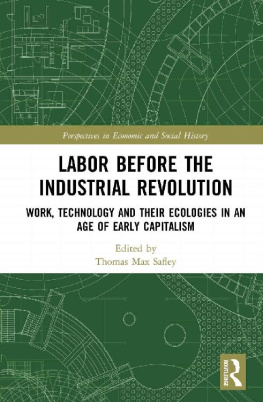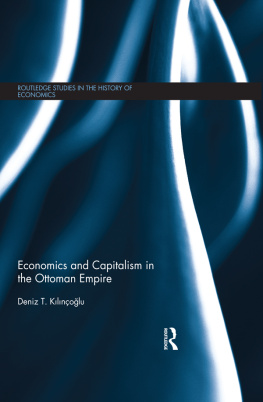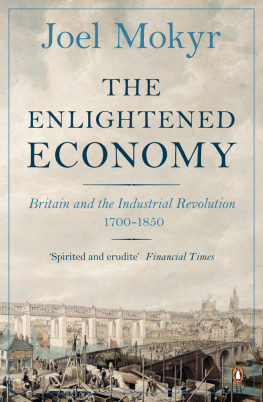British industrial capitalism since the Industrial Revolution
British industrial capitalism since the Industrial Revolution
Roger Lloyd-Jones and M. J. Lewis
Sheffield Hallam University
Roger Lloyd-Jones and M.J. Lewis 1998
This book is copyright under the Berne Convention.
No reproduction without permission.
All rights reserved.
First published in 1998 by UCL Press
Reprinted 2003 by Routledge
11 New Fetter Lane
London, EC4P 4EE
Routledge is an imprint of the Taylor & Francis Group
British Library Cataloguing in Publication Data
A catalogue record for this book is available from the British Library.
ISBNs:
1-85728-408-9 HB
1-85728-409-7 PB
Typeset in Baskerville
by Acorn Bookwork, Salisbury, Wilts.
Printed by Antony Rowe Ltd.
To our parents, for all their support over the years
Contents
Joseph Schumpeter maintained that bourgeois society has been cast in a purely economic mould: its foundations, beams and beacons are all made of economic material. Going up and going down means making and losing money. Capitalism is dynamic, exciting and dangerous. These notions were first confronted by one of the authors in a course run by Edmund Cooney at the University of York, where economic cycles ranging from Kitchens to Kondratieffs were introduced. The antecedents of this book have long roots. The ideas were first developed in articles produced for the Journal of European Economic History and the Journal of Interdisciplinary History, and we have articulated these ideas in a course on Industrial Capitalism at Sheffield Hallam University. The issue of long waves in capitalist development has been discussed with numerous colleagues over the years, and this work has benefited greatly from their advice and support. In particular we would like to thank Professor Peter Cain, who read various chapters and offered lively, incisive and critical comments. This helped focus our thoughts and to apply in a more robust fashion our ideas on the phases of British industrial capitalism which provides the focus for this book. Our collective enterprise has been strengthened by the work of our research student, Mark Eason, who provided valuable insights into the debate over education and training in the late Victorian and Edwardian periods. We would also like to thank the editors of the Journal of Interdisciplinary History and Massachusetts Institute of Technology to quote from the 1990 article by Roger Lloyd-Jones. Finally, our thanks to Ishbel Lewis, whose diligent work in proof reading and eradicating numerous howlers from the text has enhanced the quality of the final manuscript.
Since the First Industrial Revolution capitalist economies have grown unevenly; periods of rapid growth, full employment, general prosperity and material advance have been punctuated by epochs of depression, high unemployment, financial crisis, idle factories, rising poverty and a sense of general business despair. But he did make one outstanding convert to the notion of the long wave, a convert who today has a major influence on modern long wave thinking. That convert was Joseph Schumpeter, and it is his general approach to the study of the long wave in capitalist development which will provide the framework of analysis throughout this book.
We do not intend to offer a quantitative test of the long wave hypothesis in this work. There is a considerable literature on this issueothers advocate the long wave approach as an imaginative means of exploring the dynamics of the capitalist economy over the last 200 years. We shall encounter these debates throughout the book, but our examination of the history of industrial capitalism is informed by the Schumpeterian tradition, which holds that the broad rhythms of capitalist development are characterized by phases of economic upswings and downswings. The next section will discuss Schumpeters basic ideas.
One of the outstanding social scientists of the twentieth century, in his mature academic life Schumpeter was Professor of Economics at Harvard, but he was also a sociologist, a political scientist, and above all an economic historian. Writing in his most famous work, Business Cycles, Schumpeter claimed: General history (social, political and cultural), economic history, and more particularly industrial history are not only indispensable but really the most important contributions to the understanding of our problems. All other methods, statistical and theoretical, are only subservient to them and worse than useless without them.
For Schumpeter the three great branches of economics were history, statistics and theory. Of these fundamental fields he was unequivocal that economic history is by far the most important. Schumpeter accepted the reality of Kondratieff long cycles and offered a novel explanation of them, differing from that of Kondratieff himself. What are the basic propositions of Schumpeters theory of capitalist economic development, and how do they relate to his view that the long wave was a historical phenomenon?
For Schumpeter the main engine of capitalist growth and the source of entrepreneurial profits are innovations. The driving force of capitalist development comes from the new consumer goods, the new methods of production or transportation, the new forms of industrial organisation that capitalist enterprises create.
Schumpeters forms of innovation
Form of innovation | Definition | Examples |
Product | The design and introduction of new goods and services | The motor car, the TV, the personal computer, the video recorder, the compact disk, the service credit card |
Process | The introduction of new methods or technologies of production | Steam-driven machinery, the Bessemer bulk steel process, the development of continuous flow production in the chemical industry; assembly line production, robotics |
Market | Associated with the way an entrepreneur sells a product on the market. This may be associated with expanding existing markets or opening new markets | Advertising, promotion schemes, franchising, market institutions, i.e. the development of overseas sales agencies. The opening up of colonial markets in the nineteenth century to British business, the insertion of new countries into the world economy, such as the Latin American republics at the beginning of the nineteenth century, and the process of decolonization in the middle of the twentieth century |
Material | Associated with the conquest of new raw material supplies, and semi-manufactured products | Examples of the former are the opening up of the coal fields of the UK and the development of North Sea oil. An example of the latter is the mass production of intermediary products in the chemical industry, i.e. chlorine, sulphuric acid, ethylene, propylene, which acted as the building blocks for a whole new range of chemical products |
Organizational | Innovations in the ways in which firms are operated | Managerial innovation, i.e. the rise of the large-scale corporation, development of new systems of controls, i.e. joint stock companies, limited liability, trusts, holding companies, insurance companies |











